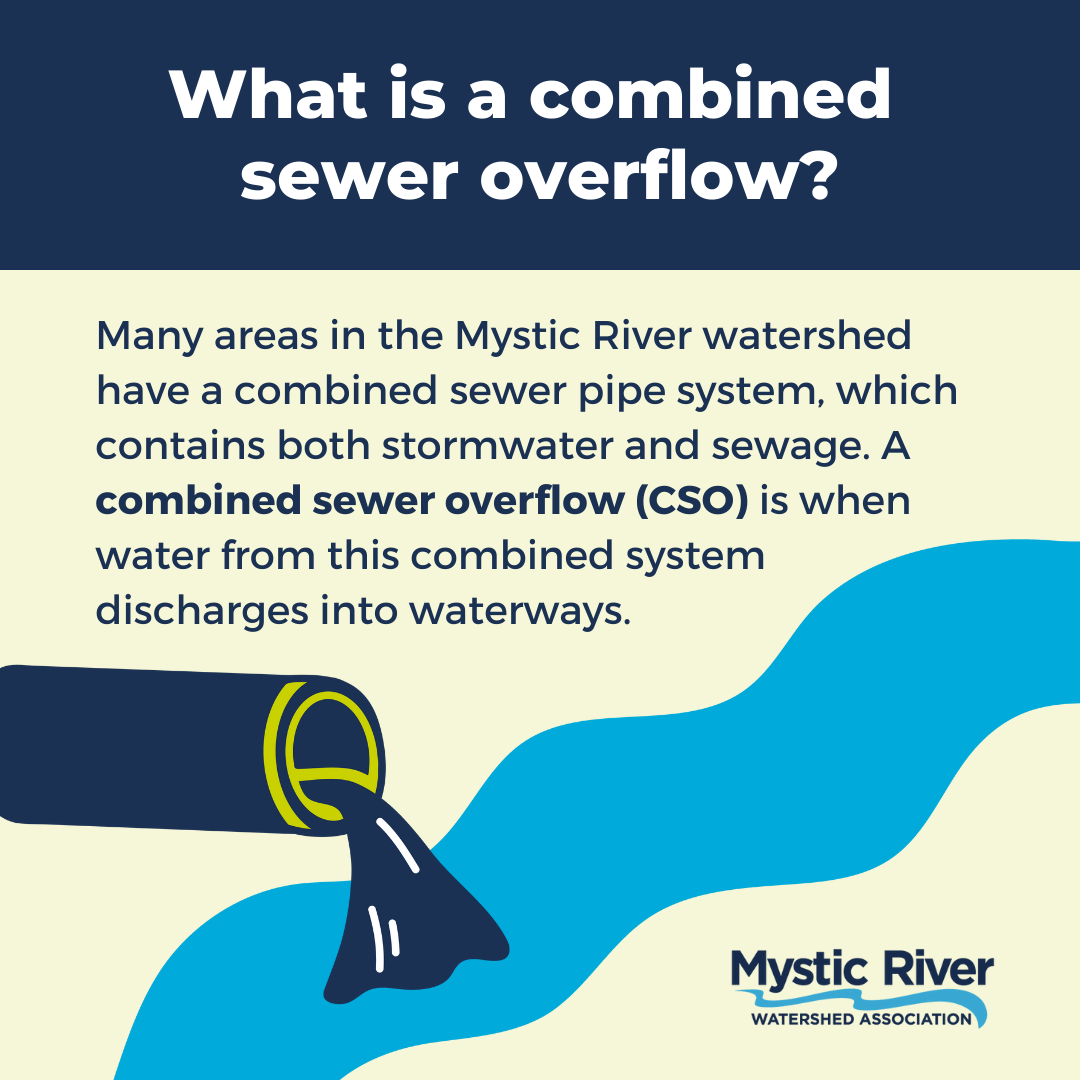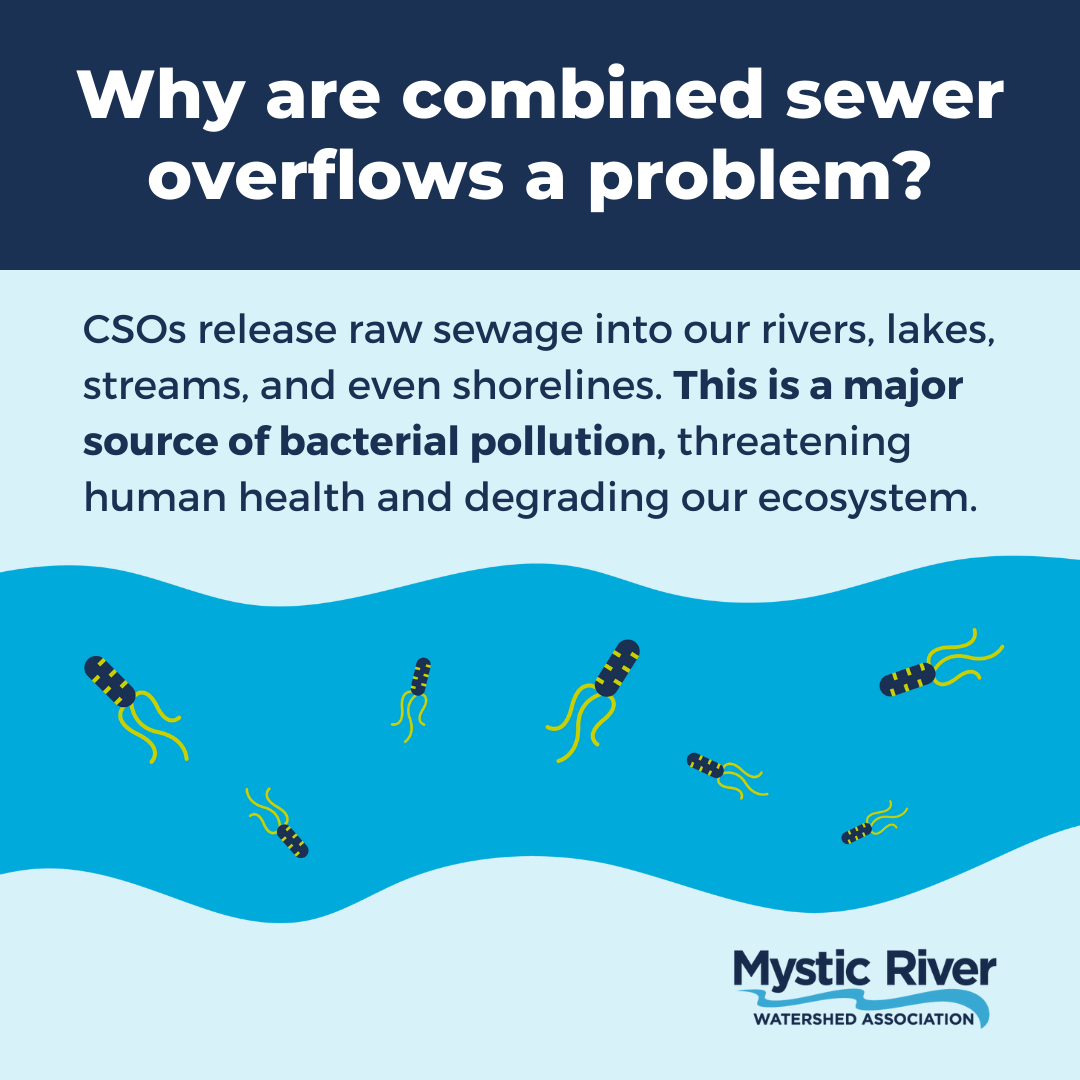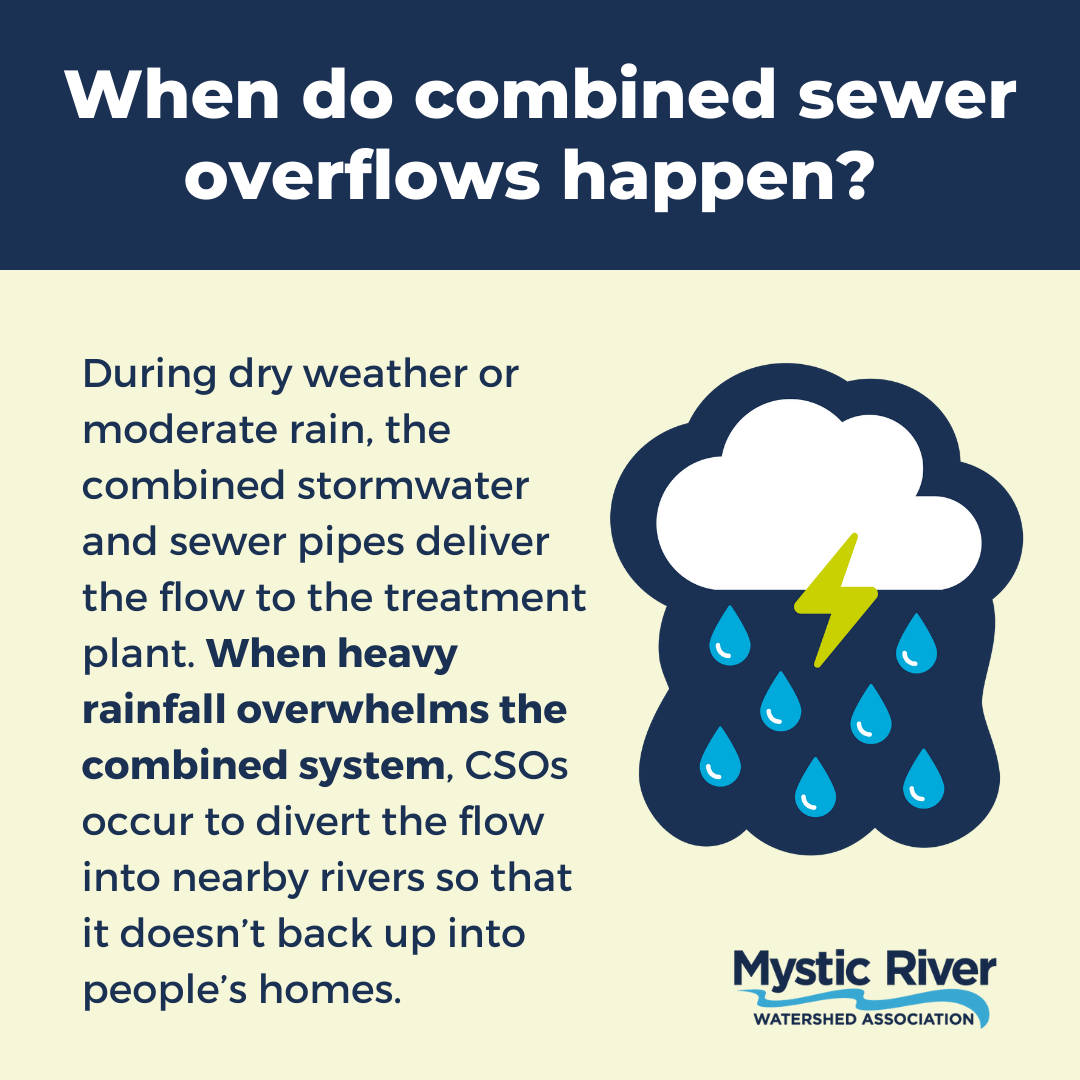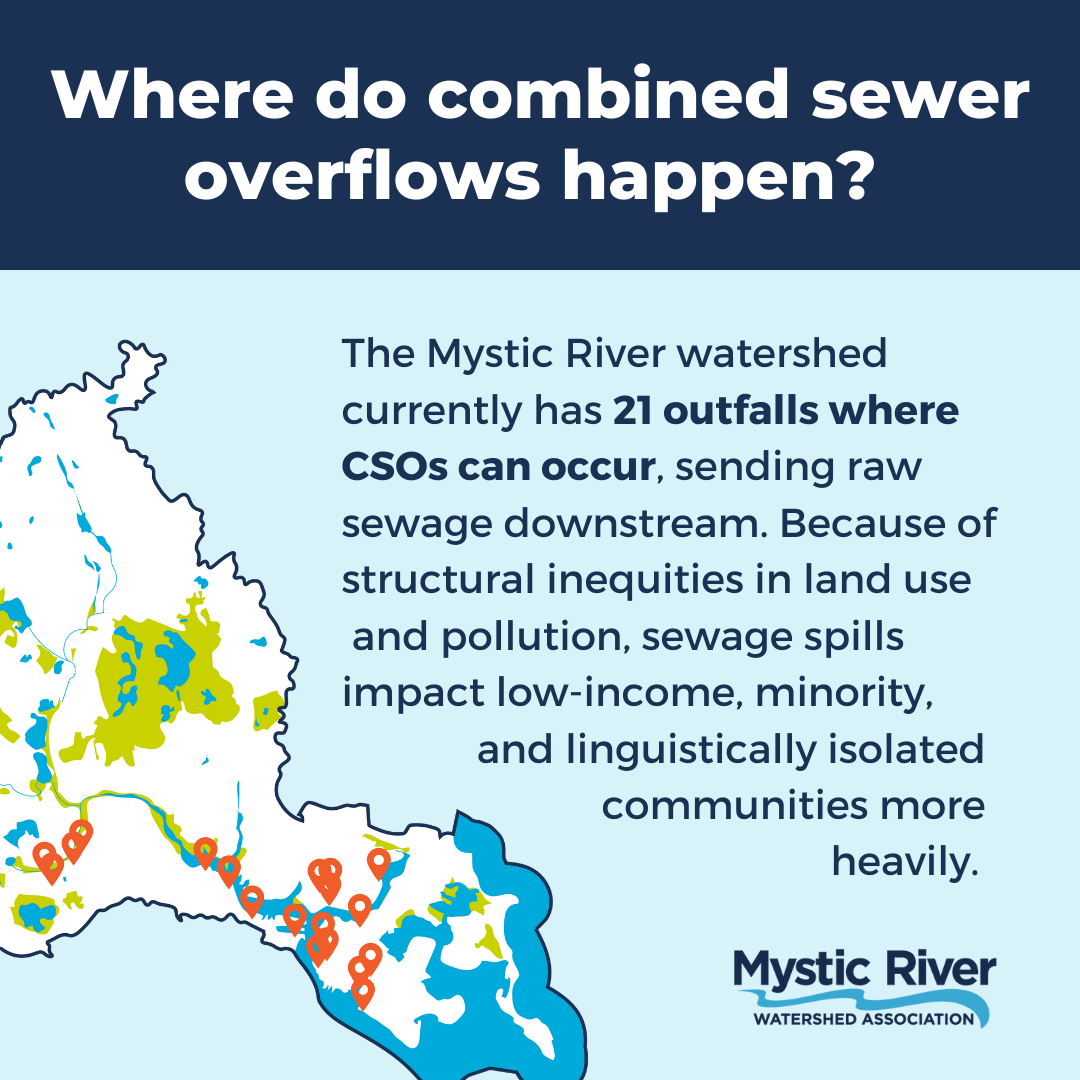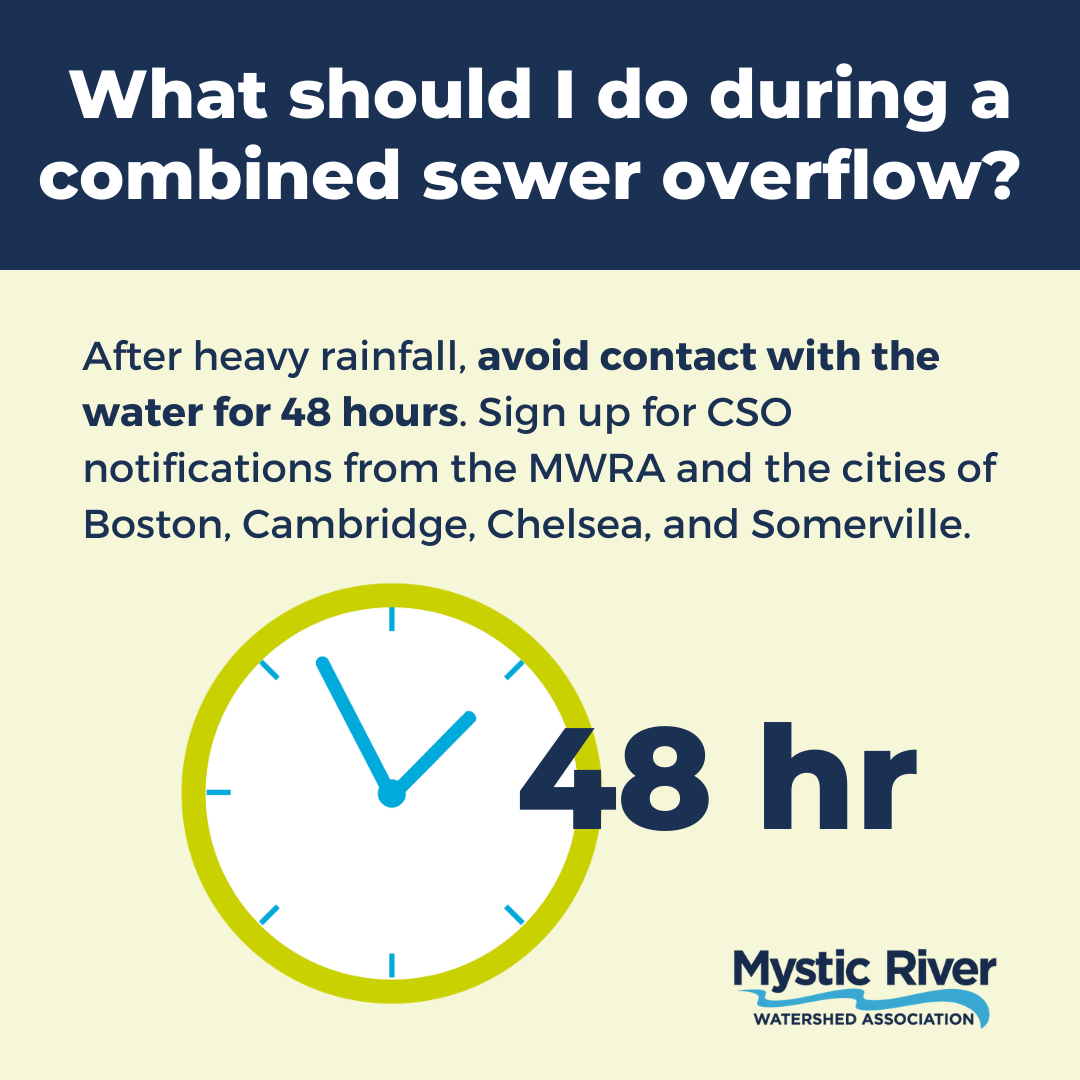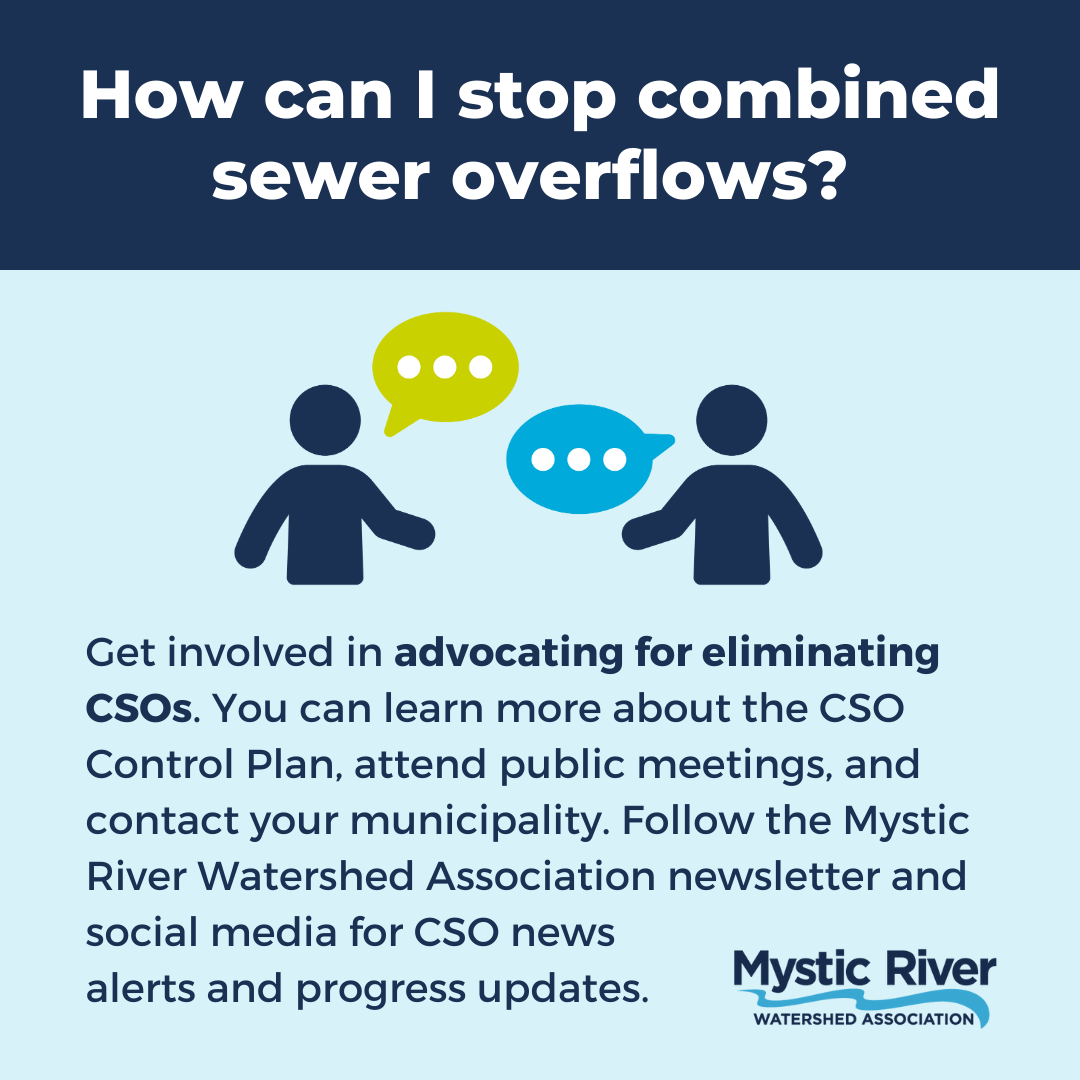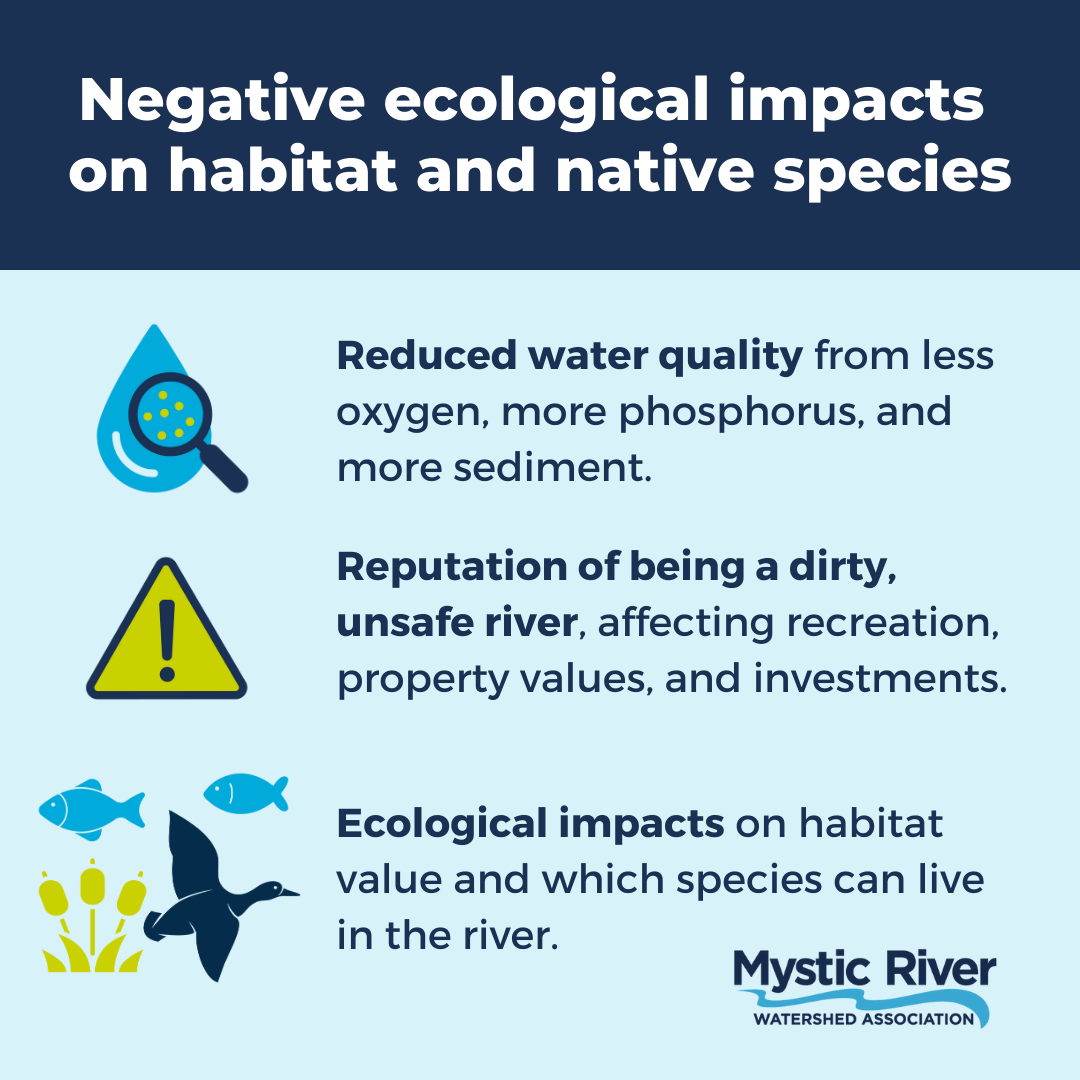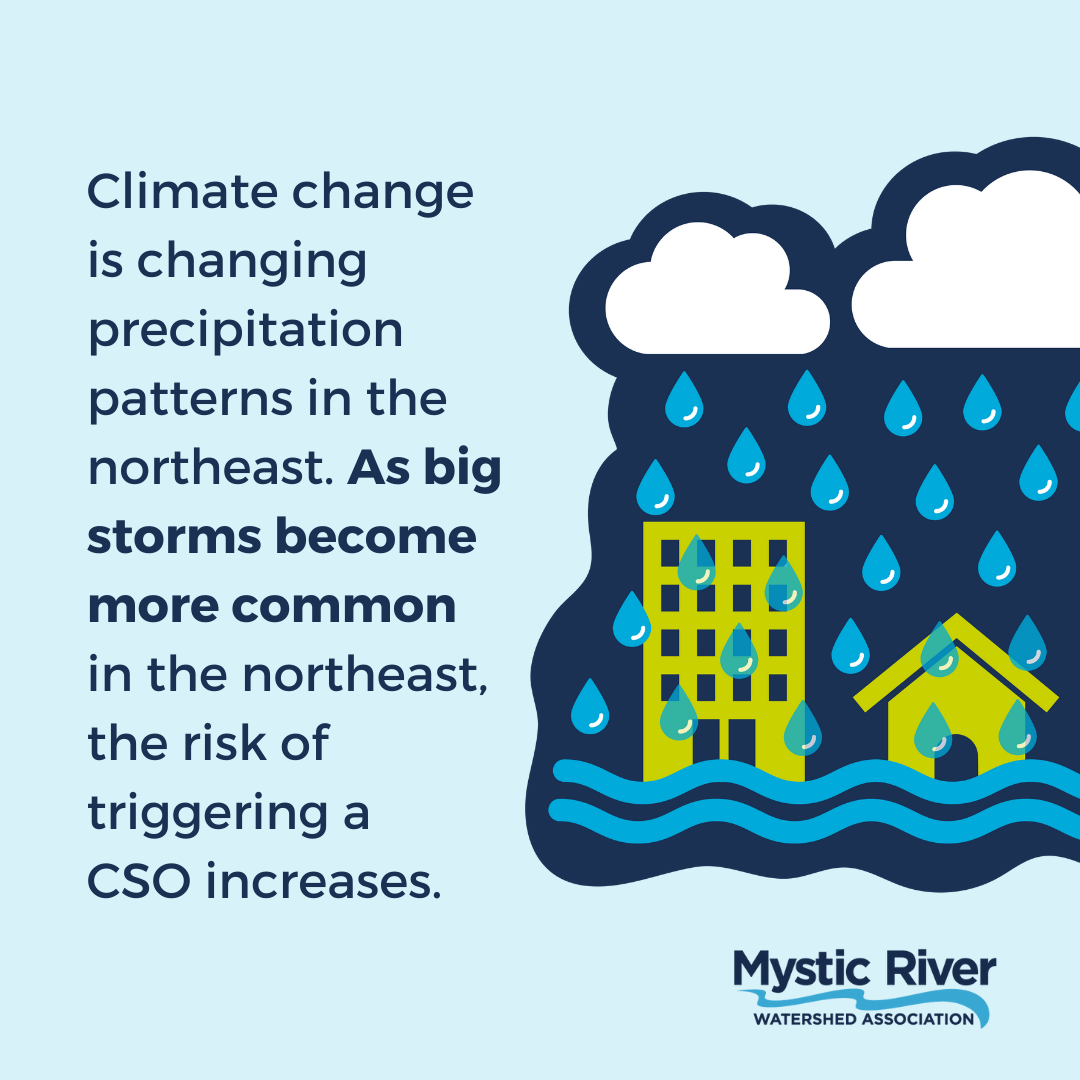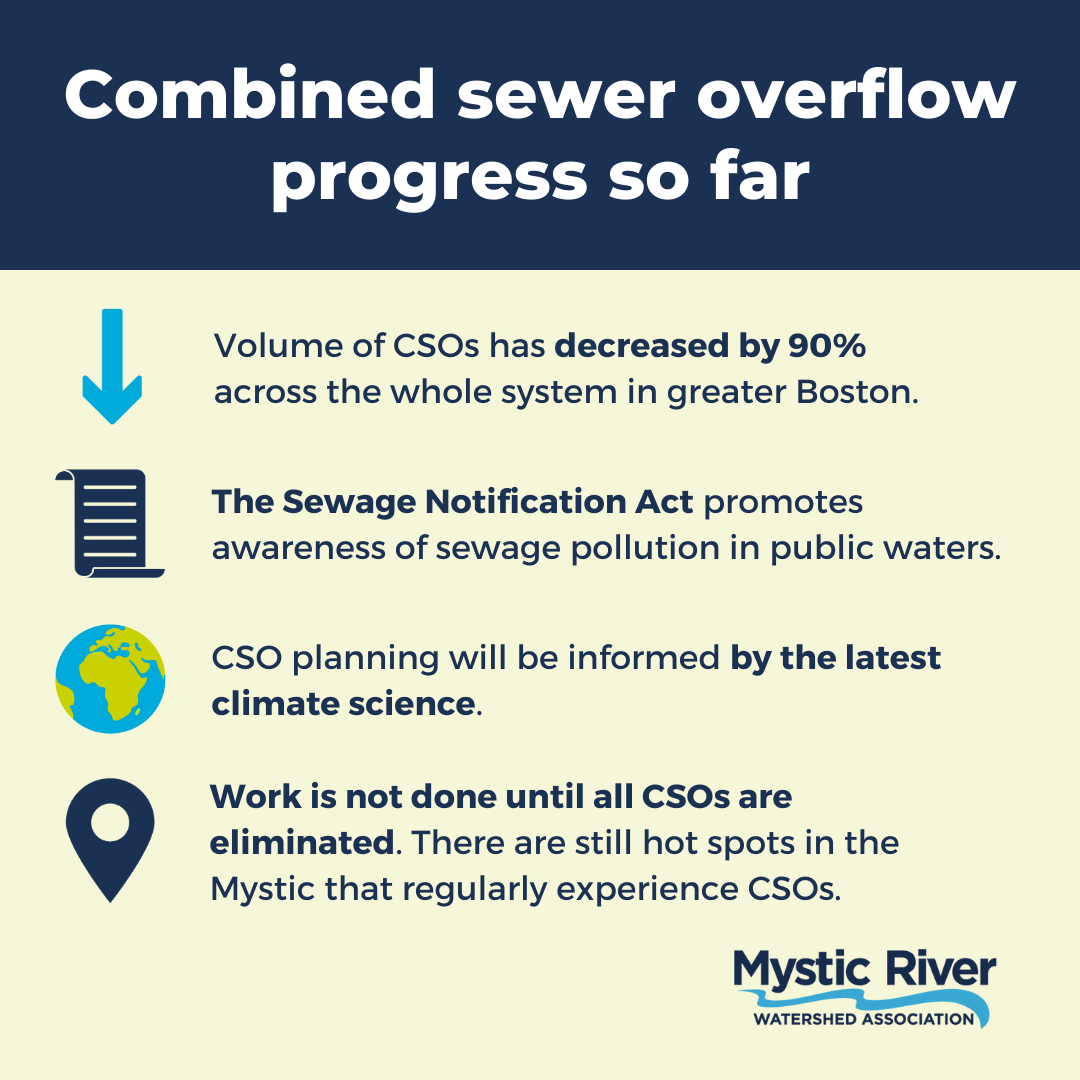COMBINED SEWER OVERFLOWS
Say no to sewage pollution. Tell our leaders that you demand a clean Alewife Brook and a Mystic River that is healthy now and in the future!
Who to Contact
Contact the MWRA at: cso.mwra@mwra.com
CC EEA Secretary Rebecca Tepper, who chairs the MWRA Board at env.internet@mass.gov
CC Governor Maura Healey at constituent.services@state.ma.us
What to Say
A self-crafted statement that is specific to your perspective and your experiences is the most likely to have an impact. You can use the outline below to craft your message:
Introduce yourself with details relevant to who you are emailing
Ex: My name is Isaiah Johnson, and I am a resident of the City of Somerville.
Describe why you are writing
Ex: I am writing to you about the recent proposal approved by the Board that would allow higher levels of sewage discharges into the Mystic River in the future. As a concerned citizen who cares about the health of the Mystic River watershed, I am deeply disappointed that the MWRA board would approve a plan that allows ongoing combined sewer overflows to the Mystic River and Alewife Brook.
Mention how this impacts you and your personal experience
Ex: I regularly paddle on the Mystic River; I bring my children to the river to fish; I walk to work every day on the Alewife Brook path.
Mention any concerns you have about your health and the health of family, friends, and neighbors who come into contact with untreated sewage.
Close by stating the following
MWRA’s own report shows that MWRA has the financial capability to nearly eliminate CSOs, yet you approved a half-measure that provides minimal control in a future climate. We can’t afford to take half-measures. We need the highest level of CSO control.
other people to contact
Your local state legislators. Find My Legislator
Your select board, town, or city council
what to say
Introduce yourself and include the fact that you are a constituent.
Ex: My name is Isaiah Johnson, and I am a resident of the City of Somerville, Ward No. 6., Precinct No. 1
Describe why you are writing
Ex: I am writing to express my concern about combined sewer overflows in the Mystic River and Alewife Brook and about recent plans put forth by the Massachusetts Water Resources Authority and the Cities of Cambridge and Somerville that would ensure more sewage discharges in the future.
As a concerned citizen who cares about the health of Boston’s rivers, I am deeply disappointed that the MWRA Board voted on February 25th to approve a plan that would allow ongoing combined sewer overflows to the Mystic River and Alewife Brook as opposed to targeting the highest levels of CSO controls.
Mention how this impacts you and your personal experience
Ex: I regularly paddle on the Mystic River; I bring my children to the river to fish; I walk to work every day on the Alewife Brook path.
Mention any concerns you have about your health and the health of family, friends, and neighbors who come into contact with untreated sewage.
Close by stating the following
MWRA’s own report shows that MWRA has the financial capability to nearly eliminate CSOs, yet they approved a half-measure that provides minimal control in a future climate. We can’t afford to take half-measures. We need the highest level of CSO control.
WHAT IS A COMBINED SEWER OVERFLOW (CSO)?
CSOs are intentional outflows of sewage and rainwater discharged into rivers and streams during very wet weather. They are the result of mid-19th century water infrastructure that is built with a connected sewer and storm drain system. During dry weather, this system works just fine, sending wastewater down the pipe and off to a treatment facility where waste and pollutants are removed. During very wet weather, though, especially when a lot of water falls in a very short period of time, the amount of water coming through the system is more than the pipes can handle, so they are designed to overflow rather than back up into people’s homes, sending both the stormwater and the sewage into rivers and streams. These events are called Combined Sewer Overflows, and they pose a risk to the health of both the people and the ecosystem downstream.
CSOs in wet and dry weather
CSOs AND THE MYSTIC RIVER WATERSHED
CSO's are a major pollution concern for the Mystic River Watershed and are a barrier to fishable and swimmable rivers as pledged in the Clean Water Act. CSO's contain not only stormwater but also untreated human and industrial waste, toxic materials, and debris. Pollutants associated with such overflows pose a risk to public health, impact water uses (swimming, boating, and fishing), and stress the aquatic environment.
CSOs also have an outsized impact on environmental justice communities. Due to CSOs and other pollutants, public health officials recommend avoiding contact with water bodies during rainstorms and for 48 hours afterward.
Where does this happen?
Currently, there 21 outfalls along the Alewife Brook, Mystic River and Chelsea River. Annual discharges from CSOs— although much reduced— are still measured in the millions of gallons—which is dangerous to people, habitat, and wildlife. Because of structural inequities in land use and pollution, sewage spills impact low-income, minority, and linguistically isolated communities more heavily. The map shows currently active CSOs (red) and ones that have been eliminated (gray).
WHAT IS BEING DONE?
CSOs must be fully eliminated in order to ensure the health of our communities and ecosystems. The ultimate solution is to fully separate stormwater and sanitary sewer pipes and close the CSOs that remain throughout Greater Boston. This will be an expensive process that involves a collaborative effort between cities and public pressure to address the problem.
Thankfully, the Massachusetts Water Resources Authority (MWRA) and the cities of Somerville and Cambridge are already engaged in a process of controlling CSOs in the Mystic and Charles River watersheds. Over the past four decades, many CSOs have been closed and more CSOs are being partially treated before they are released into our waterways.
Still, CSOs remain a pressing issue for all of us who live, work, and recreate near our rivers and streams.
CSO ALERTS
Thanks to the CSO bill H.4921, waste treatment operators are required to notify the public when there’s been a sewage discharge in their area. You can sign up for alerts to be informed of CSOs when they occur near you.
Thanks to public reporting on CSOs, MyRWA is able to track CSOs in the Mystic River watershed and better understand the threat they pose.
How can you help?
Add Your Voice to the CSO Conversation
Subscribe to the MyRWA e-news to receive updates about CSOs in the Mystic and to stay in the loop about opportunities for public involvement in the CSO Long-Term Control Plan.
Contact your legislators to let them know that you care about CSOs and want to see investment in the improvement of stormwater infrastructure. Find your legislator here.
When the opportunity arises, vote yes on increased stormwater funding in your municipality. Better stormwater infrastructure can reduce the flow of rainwater through combined systems and help mitigate CSOs.
More Information
Boston Globe - After outcry, MWRA board tables vote on Charles River sewage proposal
WGBH - Local authorities debate: How much sewage in Boston-area rivers is too much?
MassLive - Raw sewage in Alewife Brook: The unfinished chapter of Boston Harbor cleanup
WGBH - There's more to do for Boston's water quality, say watershed advocates
BU School of Public Health - Sewage Overflows Linked to Increase in Gastrointestinal Illnesses
Boston Globe Opinion - The Cleanup of Boston Harbor is Incomplete
Blog - State Proposal Would Doom the Mystic and Alewife to Perpetual Sewage Discharge
Blog - If Not Now, When? — Show Up to End Combined Sewer Overflows on September 25th
Blog - We Are in a Critical Moment for CSOs in Greater Boston - Here’s What You Need to Know
Blog - Boating Season is Here! Here’s What You Should Know About CSOs
Resources
WHAT IS A SANITARY SEWER OVERFLOW?
Sanitary Sewer Overflows - or SSOs - are illegal discharges of raw sewage that are often set off during heavy rains because of stormwater infiltrating and overloading the sewage system.
Sanitary sewer overflows (SSOs) are discharges of raw sewage into surrounding water sources and communities. Unlike CSOs, which happen where stormwater and sewage systems are intentionally combined, SSOs involve the unintentional infiltration of stormwater into the sewer system and can be caused by severe weather, improper maintenance, and vandalism. The EPA estimates that there are at least 40,000 SSOs each year across the US. Recurring SSO sites exist throughout the Mystic River Watershed, and usually occur during heavy rains because of stormwater infiltrating and overloading the sewage system. Although these overflows are illegal, they continue to occur.
HEALTH ISSUES
Sanitary sewer overflows pose a serious health risk. SSOs contaminate the surrounding environment and threaten anyone who comes in contact with the runoff. They degrade the quality of water sources and can cause flooding into homes, basements, and low-lying areas. Raw sewage can carry bacteria, viruses, protozoa, intestinal worms, and fungi. Contact with these contaminants can lead to diseases ranging from mild gastroenteritis (the stomach flu) to severe water-borne illnesses such as cholera and dysentery. Community members may come in contact with contaminated water through direct contact in residential areas, water-related activities such as canoeing or swimming, or through drinking water. For your safety MyRWA suggests avoiding contact with river water after large storm events.
SSO ALERTS
The MWRA provides alerts to SSOs in addition to CSOs. Sign up for alerts here.


